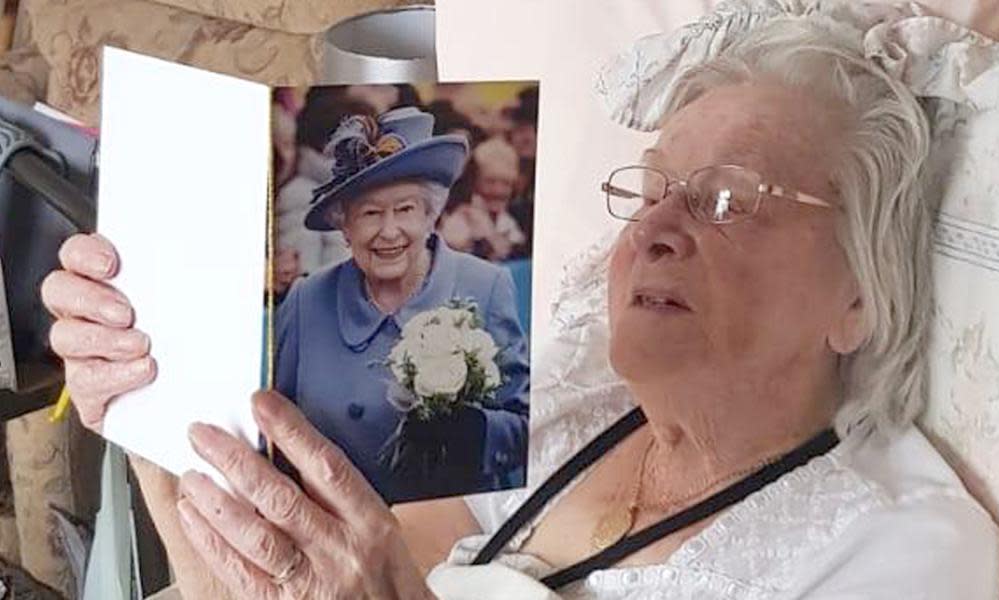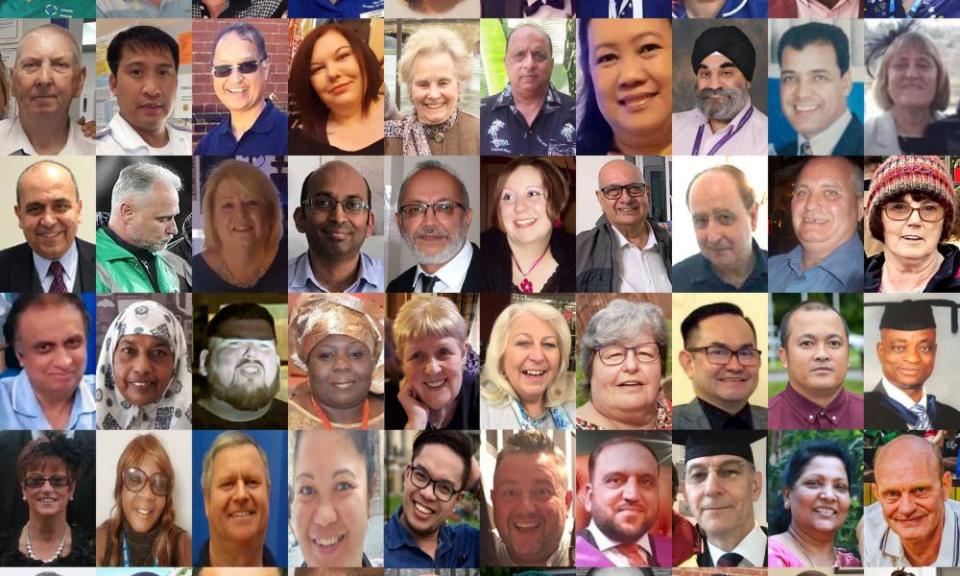More than a number: stories behind five of the 50,000 UK lives lost to coronavirus

Hilda Churchill survived the 1918 Spanish flu pandemic, not to mention two world wars, but the 108-year-old succumbed to coronavirus on 28 March, and she remains Britain’s oldest victim. Less than a week later, about 200 miles south in Watford, 23-year-old John Alagos would become the youngest medic to die from Covid-19.
And, as the death toll continued to climb over the following weeks, tributes poured in for Keith Dunnington, 54, who had worked as a nurse for more than 30 years and died at his parents’ home in South Shields on 19 April.
While his family tried to come to terms with his death they faced further tragedy: his parents, Lillian and Maurice Dunnington, who had been together for more than 60 years, passed away a day apart at South Tyneside hospital, holding each other’s hands.
These five people were living very different lives across the country. But they are now, and will always be, connected by a virus whose death toll stands at 50,000 in the UK, according to official figures. Here, behind the statistics that so often belie the human impact of Covid-19, are their stories.
A family torn apart
A nurse for three decades, Keith Dunnington worked for an agency and most recently on the frontline of ward 12 at the Queen Elizabeth hospital in Gateshead.
Known for valuing the importance on his colleagues having a proper dinner each Sunday, he often arranged food for everyone. Outside of work, he volunteered at soup kitchens and spent time with his family. He had recently moved in with his parents, Lillian and Maurice, both in their 80s.
For him, coronavirus seemed to hit hard and fast, with his condition deteriorating rapidly. When his cousin, Debbie Harvey, received a call, she expected to hear that her relative had gone into hospital; instead he had died.
Harvey is still coming to terms with the shock: “I almost passed out. It’s still hard to believe.”
A few days later, Harvey would receive another phone call, this time from her aunt – Keith’s mother – Lillian, 81. “She said, ‘Your uncle has fallen and I need help.’” Harvey rushed over to assist 88-year-old Maurice, helping him to get upright. “He looked like he had a stroke or something. He looked terrible.”
When she saw Lillian had developed a cough, Harvey told her husband she would be staying with her aunt and uncle. She arranged with the GP to get some disability aids to support them both, but Lillian only got weaker. She finally asked to be taken to the hospital, and knew she would not come out. “She said at that point, ‘I think I’ve definitely got it and I don’t think I’m going to survive it.’”
Harvey described Lillian as a beautiful soul. “She has been such an important person in my life over the past 31 years, since my mum died. She has been everything to us. We’ve always been a tight-knit family.”
Maurice had stopped eating and drinking shortly after his wife was admitted to South Tyneside hospital. Though he was not showing any coronavirus symptoms, he was taken to the same hospital. Days later, Harvey received a call telling her Lillian had passed away.
“They were holding hands when my aunty passed away. They were put together in the same room and the staff pushed their bed together,” Harvey said. Maurice died soon after his wife. On the day of the family’s funeral, the streets were lined with mourners.
Harvey said her family were struggling with the loss of so many loved ones in such a short time. She urged people to continue to physically distance and not become complacent. “I don’t believe it’s over. I think it’s still dangerous,” she said.

The youngest healthcare worker
John Alagos had returned from treating coronavirus patients during a 12-hour shift at Watford general hospital when he fell ill. The nursing assistant complained of a headache and a high temperature throughout the night, before eventually losing consciousness and dying at home. He was just 23.
Alagos is one of nearly 30 people from the Philippines or with Filipino heritage confirmed to have died from Covid-19, 18 of whom worked in the health sector. The pandemic’s heavy toll on the community has sparked anger that Filipino workers are among those bearing the brunt of difficult working conditions and a shortage of personal protective equipment (PPE).
Alagos’ mother, Gina Gustilo, a mental health nurse who lived with her son, has alleged that he was unable to return home from the hospital due to short-staffing and said a colleague told her he had not been wearing “proper” protective clothing. The hospital said it would never expect staff to remain at work if they were unwell, and that they kept staff updated on the latest PPE guidance.
Alagos’ colleague, Christine Joy Pasno, said he was kind and hard-working. “He was one of the staff who selflessly helped to look after patients afflicted with Covid-19,” she said.
Initially, it was unclear whether Alagos had died from Covid-19. It was only when friends and colleagues raised funds to help repatriate his body to the Philippines that they learned it was no longer possible as he was confirmed to have had the virus.
Pasno said: “John would have wanted his colleagues to be better protected, as he did not stand a chance himself with his plastic apron, surgical mask and gloves. Let us demand for better protection for those who still live to take care and help this society get back on its feet.”
The oldest victim
Spanish flu killed Hilda Churchill’s baby sister more than a century ago. Just eight days before her 109th birthday, a new pandemic took her life, and she died hours after testing positive for coronavirus.
Born in 1911, the retired seamstress had four children, 11 grandchildren, 12 great-grandchildren and three great-great-grandchildren. She moved to Salford with her husband during the Great Depression to find work. He died in 1992.
Her grandson, Anthony Churchill, remembered her saying that the latest pandemic was similar to the Spanish flu except that in 1918 “there were no planes, and somehow it still managed to spread everywhere”.
Churchill and much of her family became infected with the Spanish flu. Her father had collapsed in the street, while her 12-month-old sister died. “She remembered standing at her bedroom window and seeing this little coffin, carrying her baby sister, being put into a carriage and being taken away.”
Churchill had moved to a care home 10 months before she died. Abbey Healthcare, which runs Kenyon Lodge, said it was “deeply saddened” by her death. The care home launched a fundraiser shortly afterwards to create a memorial garden in the grounds of their home for all the residents lost during the pandemic.

 Yahoo News
Yahoo News 
